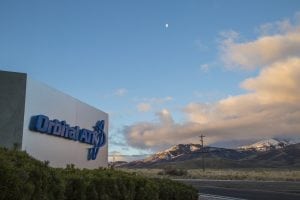Orbital ATK Confident on Satellite Demand, March Return of Antares Rocket
[Via Satellite 05-28-2015] Orbital ATK anticipates opportunities to bid on another six satellite opportunities this year, and continues to expect in its launch business to see the first flight of the re-engined Antares rocket in March 2016. In the company’s first post-merger quarterly earnings call, David Thompson, CEO of Orbital ATK told investors that commercial satellite revenues should be up well in excess of $100 million this year compared to last year and that the company’s space system’s group should see some of the most significant revenue synergies from the merger.
“For the full year 2015 we are looking at about 20 total awards [spread across the industry]. And that’s relatively consistent with our three-year outlook for between 20 and 24 orders per year in 2015, 2016 and 2017,” said Thompson, adding that four orders Orbital ATK won in the past 12 months were for its newest satellite line, the medium-class GEOStar 3. “The new business pursuit pipeline looks pretty robust right now for the rest of the year. We think we will probably have opportunities to bid on another probably six satellite opportunities between bids that are currently outstanding and those that are expected to go in at the end of the year, and we are targeting three or four wins, two of which are already booked for 2015.”
This year Orbital ATK won a contract from SES for the LuxGovSat military satellite, and a NASA contract to build up to three Joint Polar Satellite System (JPSS) spacecraft. Yesterday, Arianespace launched the first Orbital ATK-built satellite of the year, Sky Mexico 1, aboard an Ariane 5 rocket.
According to the company’s adjusted pro forma financial results, Space Systems Group (SSG) revenues increased by 4 percent, up $11 million, and operating income rose 12 percent, up $2.3 million, mainly from higher revenues and margins in the company’s commercial satellite division. This increase helped to partially offset an $18 million decrease in Flight Systems Group (FSG) revenue, down due to lower revenues in the company’s launch vehicles division.
Thompson said Orbital ATK completed a full duration hot-fire certification testing of the replacement main engine for the Antares rocket earlier this year. Though already previously intent on replacing the AJ-26 engines from Aerojet Rocketdyne, Orbital ATK redoubled its efforts following the October 2014 launch failure. The company is replacing the AJ-26s with the Russian-built RD-181 engines from NPO Energomash.
“The testing started in late March and was completed in early May. It involved a series of seven certification firings of the engine, all of which went as expected,” said Thompson, adding that the first of two flight engines has completed acceptance testing, with the second scheduled for next week. “We expect those first two flight engines to be delivered to us in early July.”
Orbital ATK’s primary customer for Antares to date has been NASA for resupply missions to the International Space Station (ISS) through a $1.6 million Commercial Resupply Services (CRS) contract. Small satellites are often included as secondary payloads for deployment from the ISS. Orbital ATK is upgrading both the Antares rocket and the Cygnus capsule to improve the capabilities of each.
“Vehicle modifications to the first stage air frames that had previously been built are proceeding on schedule, and the launch complex repair work at Wallops Island is also on track for completion in September. This all adds up to our being able to conduct full system testing late this year and into January of 2016, and to holding an initial launch date for the re-engined Antares in March of 2016, with about one month of schedule margin available to us at this time,” said Thompson.
Orbital ATK contracted out a substitute CRS launch using United Launch Alliance’s (ULA) Atlas 5 rocket to deliver a Cygnus capsule from Cape Canaveral, Fla. in the fourth quarter of 2015, and plans to consolidate its remaining five CRS missions into four. The ULA agreement includes an option for a second Atlas 5 launch.
Blake Larson, chief operating officer of Orbital ATK, said that, from a cost-synergy perspective, Orbital ATK is on track to achieve cost reductions greater than $60 million in 2015 and $100 million or more in calendar 2016. Just over half of these savings will go to customers, with the remainder going to the company’s bottom line. Orbital ATK has streamlined its staff headcount by more than 900 people and plans to cut back on 500,000 square feet of facility space.
In addition to space systems, Larson said flight systems should also see significant revenue synergies from the merger. Thompson noted that Orbital ATK also received its first synergy-enabled contract win in the form of a new high-energy space propulsion system order from ULA.
